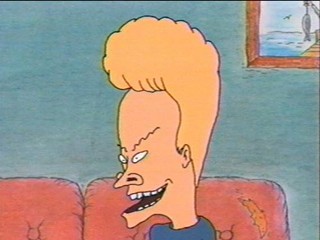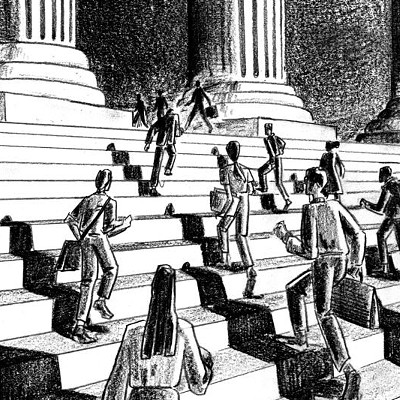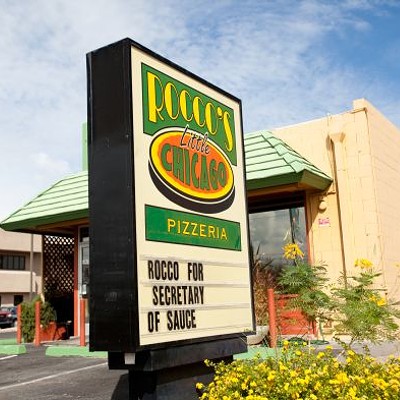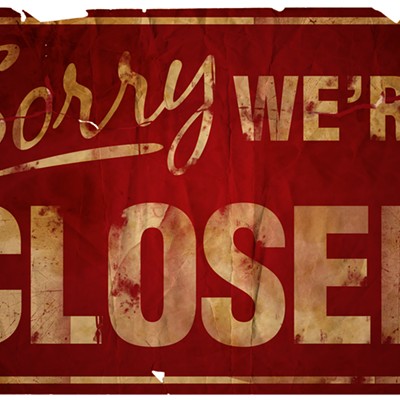The series--which in 2003 consisted of six one-hour shows--has won numerous accolades. It received the 2000 Golden Reel award and the 2001 Silver Reel award from the National Federation of Community Broadcasters. And most recently, it received the 2003 Edward R. Murrow award for news documentary in the radio network division.
About 85 stations nationwide air the show, which focuses on LGBT stories but is geared toward a mainstream audience, and it's distributed by Public Radio International. The 2003 series featured reports on topics such as life as a gay trucker, queer children abandoned by their parents and growing old with grace in the gay community.
But it can't be heard on Tucson's Public Radio International affiliate, KUAT AM/KUAZ FM. This fact upsets Gilmore, a Tucson resident who moved here from Northern California in 2001.
"I think KUAZ is falsely afraid to air programming like this with concerns that they're going to offend their donor base," Gilmore says. "But they won't say that."
Indeed, they won't. Jack Parris, the general manager and director of KUAZ, says there is one--and only one--major reason that KUAZ won't air Outright Radio.
"For one thing, it's on KXCI radio," he says. "That's the main thing. Normally, we don't carry any programs that are on any other (local) stations."
This explanation by Parris and the rest of the KUAZ staff hasn't satisfied some prominent members of Tucson's LGBT community, who have been writing, e-mailing and calling KUAZ for more than a year in an effort to get the station to pick up the show. Earlier this year, the newsletter from Wingspan, Tucson's LGBT community center, implored members of the community to contact KUAZ.
Terral Rich, the former president of the Community Business Association, a LGBT business networking association, wrote KUAZ program director Ed Kesterson a letter in July 2002 urging him to pick up Outright Radio.
"The program has quite a bit of renown and is aired all over the country," Rich told The Weekly. "So why isn't it aired (on public radio) in Tucson? It doesn't make sense. Everybody in the LGBT community feels the same way."
While he did get a response to his letter, Rich was far from impressed.
"I think (Kesterson) just wrote the 'yadda yadda yadda' letter in response," he says.
David Morden also wrote to KUAZ. He says he was told by a KUAZ representative that there was not an audience base in Tucson for a show like Outright Radio.
"I said, 'This is crazy,'" Morden says.
The run-around that Morden and Rich received is typical of what he and his fellow Outright Radio staffers have gotten from KUAZ, Gilmore says. He claims that KUAZ has given a variety of excuses for not airing the show, all of them disingenuous. He says even the excuse that the show's on community radio station KXCI doesn't even fly, claming that KUAZ turned him down before KXCI picked up the show.
Parris denies this is the case. He says he's talked to all his predecessors, and they said they were never approached about the program before KCXI picked it up.
"There certainly is no conspiracy against having LGBT issues on any of our stations," Parris says. "The reason we chose not to pick up the program is that it's on KXCI. Unfortunately, Mr. Gilmore doesn't buy that."
Instead, Parris says, KUAZ airs other programming dealing with LBGT issues. He points to the 64 LGBT-related stories that were aired on NPR's Morning Edition, Fresh Air and All Things Considered in 2002, and the more than 40 stories on the same shows so far in 2003. He also says that the station's new quarterly show, Arizona Spotlight, featured Wingspan in March, and will be featuring the Lesbian Looks film festival in September.
"We feel that we can serve the LGBT community better by doing local programs, rather than just by picking up Outright Radio," Parris says.
Nonetheless, Gilmore and others in the LGBT community feel that the community is being done an injustice by KUAZ not picking up Outright Radio. Gilmore says that 40 percent of the content of the 2003 Outright Radio series was Tucson-focused, and that the fact that KXCI airs the show shouldn't stop KUAZ from picking it up.
"Our shows are designed for NPR and PRI stations," he says. "It's not really a community radio program. It's a little mainstream."
Gilmore also notes that with KUAZ's larger audience and transmitter signal, the show would reach more people. And he says he'll keep fighting to get KUAZ to pick up the show.
Will this happen?
"You never say never," Parris says. "We have no present plans to do it. But if the situation changed, it would be something to consider."













